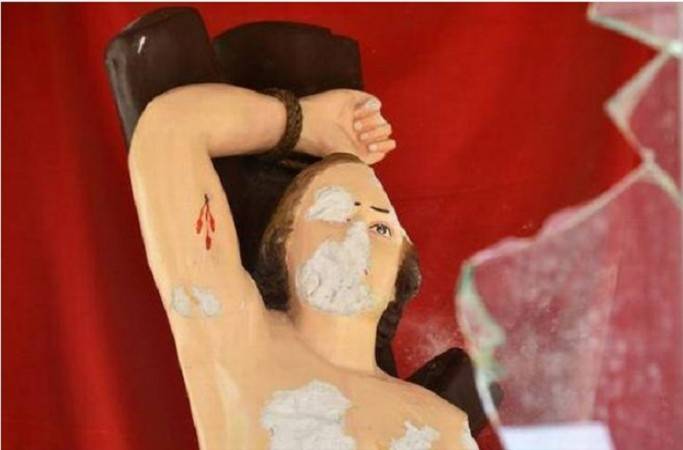St. Sebastian's statue vandalized in South India, police register case

Christians have expressed shock at vandalism in a Church in Tamil Nadu in the Southern state of India.
Some media outlets have noted increasing tensions fanned by right-wing political groups over a 'forced conversions' narrative in Tamil Nadu state.
Two unidentified men vandalised a statue of Saint Sebastian late on Sunday, January 23, in the premises of a church in Coimbatore.
Two men defaced a statue of Saint Sebastian at the shrine at the entrance to the Holy Trinity Church in Ramanathapuram, the police said.
According to media reports, the incident occurred shortly after 10 p.m. Police said two unidentified men came on a motorcycle to the church premises on Sunday night and entered the church forcibly. One of them scaled the gate.
With a brick, the intruder shattered the glass plane of the shrine within the church compound and then vandalised the statue.
The pair escaped before the security guard could catch them. The security guard notified the church's priests, who notified the Ramanathapuram police.
The police opened an investigation into two unidentified men following a complaint lodged by Father Bastin Joseph, the church's assistant vicar.
Though the church is located near the busy Ramanathapuram junction in the city, there was little vehicular and pedestrian traffic on Sunday due to the total lockdown.
The police stated that they had gathered several surveillance camera images from the area and searched for the two men.
The Holy Trinity Church is part of the Syro-Malabar Catholic Church.
The Deccan Herald noted that the probable cause of the incident has its roots in an incident where the Bharatiya Janata Party and a few other right-wing outfits in the state have blamed "forced conversion" as the reason for the suicide of a 17-year-old girl student who was studying in a Christian school and staying in a hostel run by a Christian missionary.
Though police have ruled out religious conversion angle, BJP insists that the girl took the extreme step of taking her own life due to pressure from the warden on her to convert to Christianity.
Radio Veritas Asia (RVA), a media platform of the Catholic Church, aims to share Christ. RVA started in 1969 as a continental Catholic radio station to serve Asian countries in their respective local language, thus earning the tag “the Voice of Asian Christianity.” Responding to the emerging context, RVA embraced media platforms to connect with the global Asian audience via its 21 language websites and various social media platforms.














